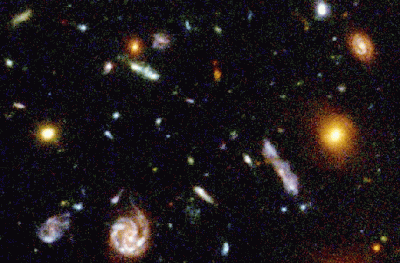The comet hunting results were mixed. Maybe I saw it, maybe I didn't. The best one can expect from this particular comet is that it will look like a small fuzzy puff of light. Did I see that? Well, yes, but the problem is that at the moment it's pretty close to the Milky Way, so there is no lack of small fuzzy puffs of light in the area. So I know I was looking where the comet was, and I had fun. Whether I actually saw it or not is in some doubt.
Not too surprising. This comet is less bright than was predicted, and as I said it's in a fairly crowded field right now. I chose these nights because they were clear, and we don't get many clear nights in this part of the country. Also the Double Cluster is easy to spot and I thought it would give me some guidance. But the observing sites on the Net say that a lot of people are having trouble finding it with binoculars, though some pictures taken with telescopes are coming through. I may try again later in the month when it's moved a bit. Though by then the moon will be making trouble for this sort of observing. It may be a wash for this particular comet.
I've been an astronomy enthusiast since I was a teenager. I've been a subscriber to a magazine called Sky & Telescope since those days - more than 50 years now - and I still read in the field of cosmology and marvel at what has become known about our universe just in the decades of my life. I've seen a bunch of comets over the years, when the sky and the comet's location will cooperate, so I know that when it comes to seeing the smaller ones it's a matter of luck. But I often try, just to see what I can see.
But that's not the whole story for me: there's more to this than just the excitement of astronomy. There's a direct link to my spiritual path. Nothing awakens my sense of awe more than looking at the night sky, and seeing it through a telescope or binoculars just increases that awesomeness. Knowing that I am looking into space more vast than my mind can comprehend, and that what I see carries me back in time as well as out in space - since the light from some of those stars has been on its way to us for hundreds or thousands or millions of years - that to me is awesome. And I mean awesome in the original sense of that word, before it became an expression that now seems to mean 'mildly interesting'.
This is tied up with my desire to pray, because having a sense of awe is directly connected to the ability to pray. If you're seeking to be in the presence of God, you are looking for something (someone) that is literally inconceivable. We have all kinds of thoughts about God, and all sorts of images of what God is like, but in the end, God is beyond all of that. To actually enter into relationship with the Divine, you have to go to that place where your mind shuts down in the face of a reality that you can't comprehend. You have to be able to encounter a love that is so vast that you can't think or know or conceive of it. You have to be willing to be with the One who is beyond anything that you can think. It is here that you enter into the reality that mystics call Apophatic, a Greek word that means "without images". You have to perceive something greater than that which can be perceived. You have to abandon words and thoughts and images.
And here we enter into the realm of phrases that don't seem to make sense. John of the Cross called this sort of prayer "silent music" and "the dazzling darkness". If you read in the Christian mystics you find yourself in the realm of these mixed metaphors and confusing references. And you also find that it is said that two things will penetrate that silence and that darkness, and they are love and awe.
On the bulletin board behind my desk I keep a large photo called the Hubble Deep Field. It is a picture that was made by the Hubble Telescope over a long period of time. The telescope was pointed to an apparently empty patch of sky and left to make a very long exposure photograph, and what emerged was hundreds and thousands of galaxies. They are so far away that they are nearly invisible, and some of them lie at the farthest limits of the Universe, and reach back a good way to the beginning of time itself. There's no way I can look at that photo and have much in the way of thoughts. Thousands and thousands of galaxies, containing millions and billions of stars, the light from which has been on its way to us for more than a billion years. I keep that photo there because it awakens my sense of awe, and it is with my awe awakened that I long to enter prayer.
 The Hubble Deep Field.
The Hubble Deep Field.Picture from the Space Telescope Science Institute web site.
Other people have various ways of accomplishing this. Mountains do it for a lot of people (of whom I am one) and the ocean does it for others. Some are awe-struck by the ways in which love works itself out between people and some find it in the complex simplicity of a single flower.
Critics of contemplative prayer say it is nothing more than narcissistic wool-gathering, and Lord knows, it can degenerate into that easily enough. But beyond that, awe keeps calling, summoning us to know what is beyond knowing, and hear what is beyond hearing and to love what is beyond all that we know of loving. God is quite simply beyond all of our ideas of God, and we have to find a way of going beyond our ideas. Looking at the depths of our universe helps nudge me a bit of the way there. It's up to you to find what gives that nudge to you.


No comments:
Post a Comment